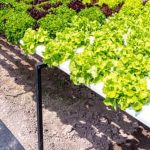CCA treated pine is a popular choice for constructing garden beds and structures due to its resistance to decay and insects. However, the question of whether it is safe for use in vegetable gardens has sparked controversy and concern among gardeners. Understanding the potential risks and regulations surrounding CCA treated pine is crucial for ensuring the safety of your vegetable garden.
CCA, which stands for chromated copper arsenate, is a type of preservative used to treat pine wood, providing protection against rot and pests. The use of CCA treated pine in vegetable gardens raises important health and safety considerations, as chemicals from the treated wood can potentially leach into the soil and pose risks to both gardeners and consumers of the vegetables grown in such environments.
Despite its effectiveness as a preservative, CCA treated pine has faced scrutiny over its safety in vegetable gardens. This has led to an ongoing debate within the gardening community about whether the benefits outweigh the potential health risks associated with using this type of treated wood. Understanding the controversy surrounding CCA treated pine is essential for making informed decisions about its use in your own vegetable garden.
Health and Safety Concerns
CCA treated pine has been a popular choice for constructing garden beds and structures due to its durability and resistance to decay. However, concerns about the safety of using CCA treated pine in vegetable gardens have been raised. Many gardeners are questioning whether CCA treated pine is safe for growing fruits and vegetables.
The potential risks of using CCA treated pine in vegetable gardens are a cause for concern. One of the main worries is the possibility of chemicals leaching into the soil, which could then be absorbed by the plants and ultimately consumed by individuals. The health concerns for both gardeners and consumers of the vegetables are significant, as ingesting these chemicals can have adverse effects on human health.
In response to these concerns, some individuals have advocated for regulations and guidelines surrounding the use of CCA treated pine in vegetable gardens. Understanding any existing restrictions or bans on this type of material is crucial when considering its use in gardening. Additionally, exploring alternative materials for building garden beds and structures is a proactive approach to addressing these health and safety concerns.
Regulations and Guidelines
Overview of Regulation
CCA treated pine has been a popular choice for outdoor structures, including garden beds, due to its resistance to decay and insects. However, concerns about the safety of using CCA treated pine in vegetable gardens has led to regulations and guidelines being put in place to address these issues. The use of CCA treated pine is regulated by several government agencies and industry organizations, all with the goal of protecting public health and the environment.
Restrictions and Bans
In response to the potential risks associated with using CCA treated pine in vegetable gardens, some jurisdictions have placed restrictions or bans on its use. For example, in certain areas, there are limits on the types of plants that can be grown in soil containing CCA treated pine, while others have outright banned its use in vegetable gardens.
These measures are aimed at reducing exposure to the chemicals present in CCA treated pine and minimizing any potential harm to consumers of vegetables grown in such environments.
Compliance With Guidelines
For those who still choose to use CCA treated pine in their vegetable gardens where it is not prohibited, strict adherence to guidelines is essential for mitigating risks. This includes following proper installation procedures, maintaining barriers between CCA treated wood and soil, and utilizing protective equipment when working with CCA treated pine. Gardeners are also encouraged to regularly monitor the condition of their structures and promptly address any deterioration or damage.
While regulations and guidelines provide a framework for safe usage of CCA treated pine in vegetable gardens, it is important for individuals to educate themselves on these standards before making decisions about using this material. It
Alternatives to CCA Treated Pine
When it comes to choosing materials for vegetable garden beds and structures, many gardeners may be concerned about the use of CCA treated pine. While CCA treated pine has been commonly used for its durability and resistance to decay, there is growing concern about its safety in vegetable gardens. If you are looking for alternatives to CCA treated pine, consider the following options:
1. Cedar: Cedar is a popular choice for garden beds due to its natural resistance to decay and insect infestation. It is a safe and non-toxic option for vegetable gardens, making it a great alternative to CCA treated pine.
2. Recycled plastic or composite lumber: These materials are made from recycled plastics and wood fibers, providing a durable and environmentally friendly option for garden beds. They are also resistant to decay and require minimal maintenance.
3. Untreated hardwood: Hardwoods such as oak or redwood can be used as an alternative to CCA treated pine. While they may not have the same level of resistance to decay, they can still be a durable and safe option for vegetable gardens when properly maintained.
When considering alternatives to CCA treated pine, it is important to weigh the safety and environmental impact of each material. By choosing safer alternatives, gardeners can create healthy and sustainable environments for their vegetable gardens without compromising on durability or functionality.
Ultimately, the decision of which material to use in your vegetable garden will depend on your specific needs, budget, and concerns about safety. It’s always best practice to research and consider all factors before making an informed decision that aligns with your values and priorities regarding the safety of your vegetable garden.
Testing and Research
Research on the safety of CCA treated pine in vegetable gardens is an important topic for gardeners to consider. Various scientific studies have been conducted to determine whether this type of treated pine poses any risks to plants, soil, or human health. Understanding the results of these studies can help gardeners make informed decisions about using CCA treated pine in their vegetable gardens.
Scientific Studies and Findings
Several research studies have been carried out to assess the potential risks associated with CCA treated pine in vegetable gardens. These studies have focused on examining the leaching of chemicals from the treated wood into the surrounding soil, as well as the impact on plant growth and food safety. Results have varied, with some studies indicating that minimal amounts of chemicals leach into the soil, while others have found higher levels of contamination.
One study published in the Journal of Environmental Quality found that small but detectable levels of arsenic, chromium, and copper did leach from CCA treated pine into the soil when used in vegetable gardens. This raised concerns about the potential impact on plant health and food safety.
Other research has also indicated that ingestion or inhalation of these chemicals can pose health risks to humans. Overall, these findings suggest that caution should be exercised when using CCA treated pine in vegetable gardens.
Further Research Needs
While some research has provided valuable insights into the risks associated with CCA treated pine, there is still a need for further study in this area. More extensive and long-term research is necessary to fully understand the environmental and health impacts of using this type of treated wood in vegetable gardens. Gardeners should keep an eye out for new developments and updated findings in order to make well-informed decisions about their gardening practices.
Best Practices for Using CCA Treated Pine in Vegetable Gardens
It is a common question among gardeners: “Is CCA treated pine safe for vegetable gardens?” Chromated copper arsenate (CCA) is a wood preservative that has been used since the 1940s to protect timber against decay, fungi, and insects. However, over the years, there have been growing concerns about the potential health risks associated with using CCA treated pine in vegetable gardens.
One of the main concerns surrounding CCA treated pine is the possibility of chemicals leaching into the soil and being absorbed by plants. Arsenic, in particular, is a known carcinogen and can be harmful if ingested or inhaled. This raises significant health concerns for both gardeners working with the wood and consumers who will be eating vegetables grown in soil near CCA treated pine structures.
In response to these concerns, some countries have implemented restrictions or bans on the use of CCA treated pine in certain applications, including vegetable gardens. For example, in the United States, the Environmental Protection Agency (EPA) phased out consumer use of CCA treated wood for residential purposes in 2003. It is important for gardeners to research and understand the regulations and guidelines specific to their location before using CCA treated pine in their vegetable gardens.
Scientific studies have been conducted to evaluate the safety of CCA treated pine in vegetable gardens. Researchers have tested levels of arsenic leaching into soil from CCA treated wood structures and have analyzed plant uptake of these chemicals. The results of these studies can provide valuable information for gardeners considering the use of CCA treated pine in their vegetable gardens.
| Concern | Action |
|---|---|
| Potential chemical leaching into soil | Research alternative materials such as untreated wood or composite lumber |
| Health risks for gardeners and consumers | Consider using raised beds with barriers to separate soil from CCA treated pine |
| Regulations on CCA treated pine use | Check local laws and environmental regulations regarding use of CCA-treated wood in gardening |
Case Studies and Real-Life Experiences
In recent years, there has been growing concern about the safety of using CCA treated pine in vegetable gardens. As many gardeners and consumers prioritize organic and chemical-free produce, the question “Is CCA treated pine safe for vegetable gardens?” is a pressing one. To address this question, it is important to consider real-life experiences and case studies from gardeners who have used CCA treated pine in their own vegetable gardens.
One important factor to consider is the potential for chemicals to leach into the soil from CCA treated pine structures, such as raised garden beds. Gardeners who have used CCA treated pine have reported concerns about the possibility of chemical leaching, particularly when the wood becomes wet from watering or rainfall. Additionally, there are worries about the impact of these chemicals on soil quality and the safety of consuming vegetables grown in that soil.
Anecdotal evidence also suggests that some gardeners have experienced negative health effects after using CCA treated pine in their vegetable gardens. While these testimonies are not scientific evidence, they raise important questions about the potential risks associated with CCA treated pine. These real-life experiences highlight the need for further research and understanding of how CCA treated pine may impact vegetable gardens and those who tend to them.
| Real-Life Experiences | Risks |
|---|---|
| Gardeners report concerns about chemical leaching into soil | Potential health risks for gardeners and consumers |
| Anecdotal evidence suggests negative health effects after using CCA treated pine | Impact on soil quality and safety of consuming vegetables grown in that soil |
Conclusion
In conclusion, the question of whether CCA treated pine is safe for vegetable gardens is a complex and nuanced issue. The potential health and safety concerns surrounding the use of CCA treated pine in vegetable gardens have raised significant controversy and debate. While there are regulations and guidelines in place regarding the use of CCA treated pine, it is important for gardeners to make an informed decision based on all available information.
When considering whether to use CCA treated pine in vegetable gardens, it is crucial to weigh the potential risks and benefits. While some studies suggest that the risk of chemicals leaching into the soil from CCA treated pine may be low, it is essential for gardeners to prioritize the safety of themselves and those who consume their vegetables. Additionally, exploring alternative materials for garden beds and structures may provide a safer and more environmentally friendly option.
Ultimately, before using CCA treated pine in vegetable gardens, it is recommended that individuals conduct thorough research and consider all factors involved. This may include understanding the regulations and guidelines surrounding CCA treated pine, as well as exploring alternative materials. By making an informed decision, gardeners can prioritize the health and safety of themselves, their produce, and their environment.
Frequently Asked Questions
Is CCA Treated Wood Safe for Vegetable Gardens?
CCA treated wood is not considered safe for vegetable gardens. The chemicals used to treat the wood, such as chromium, copper, and arsenic, can leach into the soil and be taken up by plants.
Is CCA Treated Pine Safe?
CCA treated pine is also not considered safe for use in vegetable gardens. Although it is a commonly used material for outdoor construction projects, the chemicals in the treatment process can pose a risk to edible plants.
Can I Use Old Pressure-Treated Wood for Vegetable Garden?
It is not recommended to use old pressure-treated wood for a vegetable garden. Even though the wood may seem weathered and less potent in terms of chemical leaching, there is still a potential risk of harmful substances contaminating the soil and crops.

If you’re looking to get into vegetable gardening, or are just looking for some tips on how to make your current garden better, then you’ve come to the right place! My name is Ethel and I have been gardening for years. In this blog, I’m going to share with you some of my best tips on how to create a successful vegetable garden.





